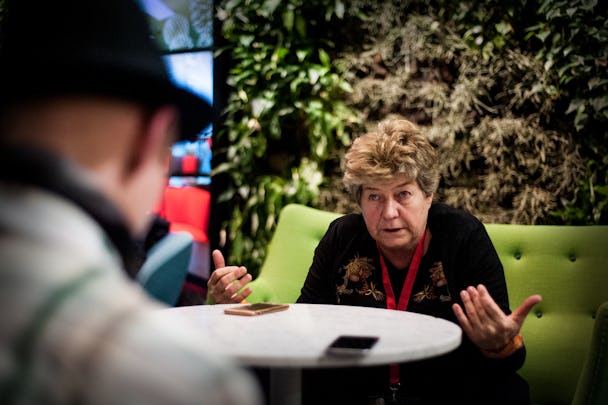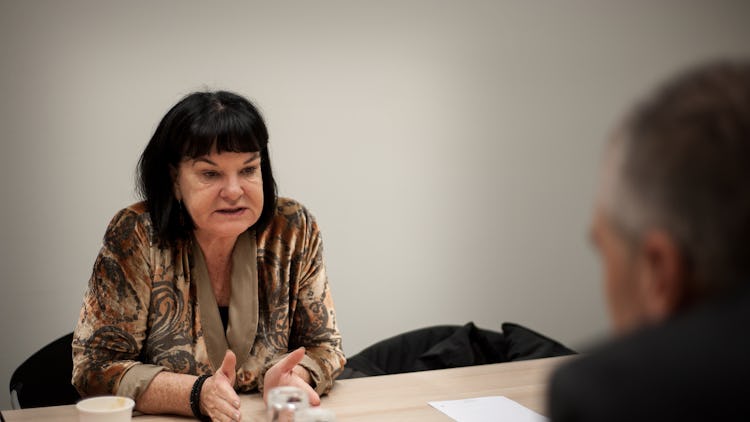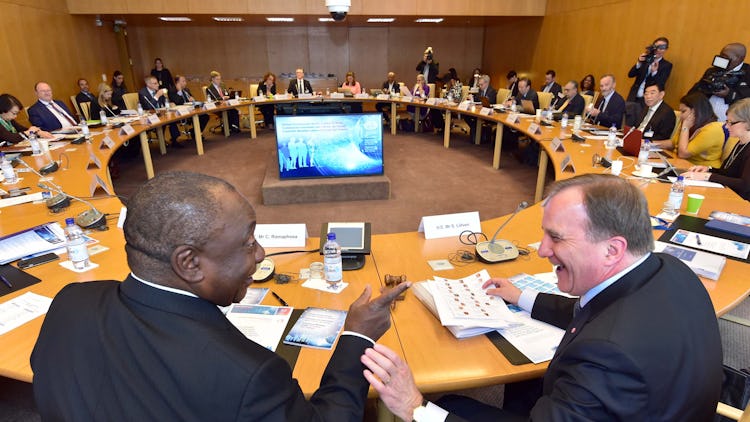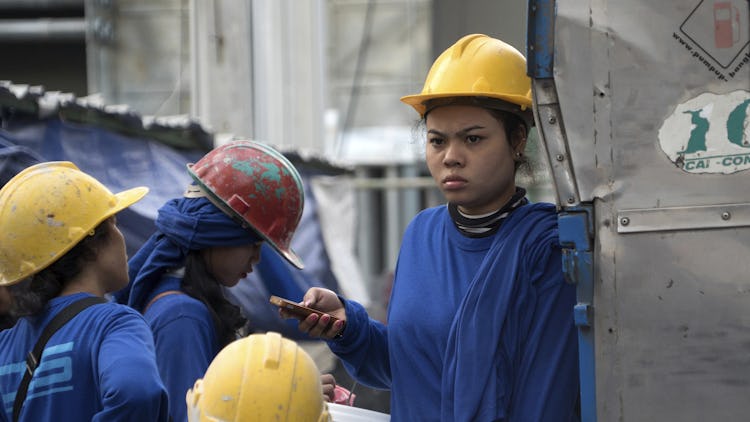Susanna Camusso: “ITUC has the possibility to be a place of real solidarity”
Susanna Camusso wants to be the next Secretary-General of the ITUC. Arbetet Global sat down with the Italian unionist to hear her thoughts on the future of the labour movement.

Susanna Camusso is challenging for the position of Secretary-General.
When and why did you decide to run for Secretary-General? Was it a sudden decision, or one that matured for a long time?
– About a year ago, this group of trade unions from all around the world were discussing the future of the ITUC. It was Latin America, Asia and some European countries. The most important issue was to change and to strengthen the ITUC. After some meetings, I decided that it was possible to play a direct role in this change and began the campaign for Secretary-General of the ITUC.
The year is 2022. Let’s pretend that you look back at four years as Secretary-General, what have you accomplished and how has the ITUC changed during these years?
– First of all, we have many affiliates that are very worried about the Workers group in ILO. The decision in the ILO about the right to strike is a big problem for us, and it was also a choice that was done without discussion with the affiliates and the trade unions. Globaly, workers are in a very weakened condition due to the crisis of globalization and neoliberalism, and it is fundamentally important that the right of free organization and the right to strike is consolidated. So how the ITUC and the Workers group discuss the future of ILO is very important. We see that employers are becoming more and more aggressive in the ILO. It is not possible to be in the ILO without a real discussion with the trade unions and about our strength and capacity for struggle as the ITUC.
– Second question; ITUC is more representative if it has a good relationship with the global union federations. But this is not the way in which the ITUC is managed today.
– The last question is principal and has to do with the relationship to the affiliates. The affiliates of the ITUC are very different. They have different historical conditions and different strength and some of them need the support and solidarity of other trade unions. I can give you an example. In Italy, we organized the workers of Amazon and for the first time did an agreement about shift work and the application of national contracts. But we know that if several countries organize Amazon workers you have the possibility to really change the working conditions. If you are alone it is very difficult, and now we are discussing and organizing with France, Germany and Spain. This is a demonstration of the kind of relationship that we need.
The ITUC Global Rights Index shows that democratic space is shrinking and that attacks on trade unionists are on the rise? In light of this negative trend, how should the ITUC go about building workers power?
– This is a question about the relationship with the national trade unions, because the ITUC is a second level structure and doesn’t organize workers directly. This is the reason we need more coordination, not only general campaigns. What the ITUC can do is strengthen workers right to collective bargaining and national contracts. As a second level structure, the ITUC has the possibility to be a place of real solidarity between trade unions.
Globally, we are seeing a wave of authoritarian leaders and the return of nationalism. In many places, far right parties are managing to attract workers votes. Why is this, and is it a problem for the labour union movement?
– I have seen what happened with the election in Sweden, and I know what has happened in Italy. When I see European workers vote for nationalist and populist parties, I don’t think that they identify themselves as workers. And they think that everyone can stand alone. But this makes workers weaker. We need to again strengthen an idea of workers, not country by country but all around the world. And for this to happen every trade union needs collective bargaining, the right to strike and to organize workers. In our Italian experience, the Five Star movement doesn’t recognize the trade unions. I think it is not an Italian problem, it is a problem of populism in general.
The world of work is changing. The division of labour is increasing, the gig-economy is growing and more jobs are being created in sectors that are harder to organize. How should the ITUC prepare for the future of work?
– I think we have a polarization between high qualified work and the work that is precarious. I think that digitalized jobs and ancient jobs will exist together for a long time. The first question is to have an idea of work that includes all this diversity.
– The second question is how much will we work? In the new jobs of digitalization, we don’t have the fixed working hours of the past when work began in the morning and stopped in the afternoon. Workers are always connected and can work in a multinational chain. So I think one question is how to distribute the work, so that we don’t get some people working 60–70 hours a week and others doing 12–14 hours a week. In Italy we say that we have to have collective bargaining of algorithms. They are the new chiefs of personnel, the new employer is an app. When we speak about Uber or Amazon, we are speaking about people who are being conditioned in their work by an algorithm. It is not science fiction, it is the creation of mathematical formulations, and we have to control how the algorithm is formed.
– The new work is not only a question about robots and automation. It is an aspect, and there are a lot of situations in which it is good news for workers. Industrial automation can change the line of production, but today, most of the digitalization is in the service sector and when we don’t have collective bargaining these workers are really alone. I think this is a process where we need to speak more about the need for trade unions. But it is a big job, to include workers and show them that these are not individual but collective conditions. Is working for Uber so different from being a Volvo or Renault or Volkswagen worker? Yes, they produce different things, but the idea and the organization is always an organization for profit.
The climate summit COP24 is currently going on in Poland. What would you say to the millions of workers in the car industry who demand what unions must fight for their jobs? How should the just transition to a green, sustainable economy look?
– I can speak about the Italian experience. We are talking to automakers about the necessity of change and we think that it is possible to do and also a condition for this industry to have a future. This year it has really become clear to a lot of people that climate change is happening really quickly. I think that in collective bargaining and the discussion about production, we have to mobilize to shorten the time of the transition and to tell employers and big industry to pay for change.

Susanna Camusso is the General Secretary of the Italian trade union confederation CGIL.
Women’s participation in the workforce is falling and in many countries, women’s rights are under attack. What should the ITUC do about this?
– In this period, the international women’s movement is more visible than the worker’s movement. Women in the USA, Latin America and Poland have reacted against the attacks and I think that the ITUC has to support this movement and to also pay very close attention to the difference in wages between men and women. That is the origin of discrimination at work.
On your campaign web page, you published a letter you sent us after we published an article about the upcoming election, along with the reply from our editors. You claim that our article contained “biased and misleading information about my candidacy”. Do you stand by that claim?
– There were three different things about the article. There was a lie, that the Italian trade unions didn’t support my candidacy, which you corrected.
– You also described CGIL in a negative way that we don’t think is a correct description of my organization and my confederation. I don’t think it is good to define CGIL using this word. [Editors note: the word used in article was “conflict-prone”.] It is not the word itself, it is the way in which it was used. For us it is a problem because it was part of the campaign from the supporters of Sharan Burrow that CGIL was a dangerous organization.
– The third is not a problem with the article but with the trade unionists. It doesn’t matter if they support me or if they support Sharan, if they don’t want to say their name or their organization this is a big problem. If one can’t say freely what they think and how they want to vote, then we don’t have a transparent and democratic climate in the organization.













